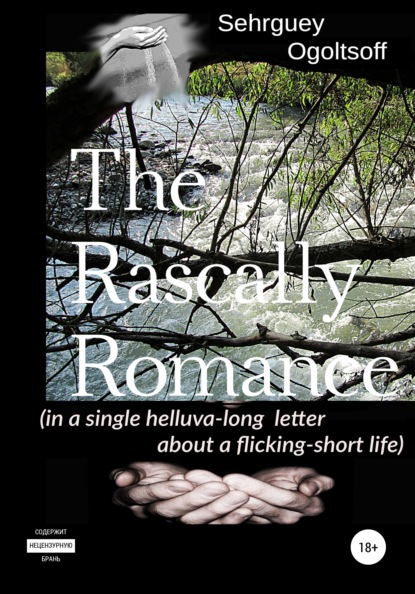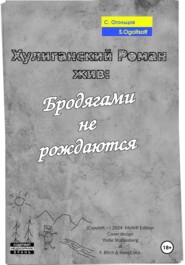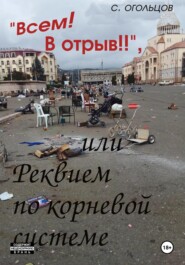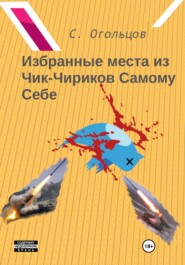По всем вопросам обращайтесь на: info@litportal.ru
(©) 2003-2024.
✖
The Rascally Romance (in a single helluva-long letter about a flicking-short life)
Настройки чтения
Размер шрифта
Высота строк
Поля
She dropped her school bag on the floor and, wrapping her arms around her head, ran along the aisle between the desks, while everyone else—both the boys and the girls—blocked her way, hooting and yelling something in her ears, and Yura Nikolayenko ran behind her and rubbed himself at her back, like dogs do, until she sat down at her desk and dropped her face into her hands.
The mayhem ceased only when the classroom was entered by a teacher asking, “What’s going on here?”, she was perplexed no less than me.
The girl got on her feet and ran out of the classroom without even picking her schoolbag up from the floor.
The next day she never showed up and we had a class meeting attended, instead of her, by her father who was red in the face and shouting that we were a bunch of scoundrels and pinched his daughter by the chest. He demonstrated with his hands where exactly were applied the pinches.
Then our Mistress told the meeting that pioneers shouldn’t disgrace themselves by nagging their classmates so disgustingly as we did because the Malvina-like girl was also a pioneer like all of us.
And I felt ashamed even though I had not been pinching or nagging anyone. The beautiful girl never more appeared in our class, probably, she was transferred to the parallel one.
(…” the crowd is a merciless beast…”
runs a line from Avetic Isahakian’s poem about Abu-Lala, which I learned very well even before reading it…)
Individual cruelty is no less ugly as collective one. In spring I got another deep scratch when witnessing an example of maternal pedagogy.
The empty afternoon Courtyard was entered, between our house and the corner building, by a woman heading to the buildings on the opposite side. Behind her, a six-year-old girl ran and sobbed holding her arm outstretched to the women and kept repeating the same words with the voice hoarse from non-stop wailing, “Mom, gimme your hand! Mom, gimme your hand!”
The rasping shrieks somehow reminded me of Masha’s screeching, when they came to slaughter her at Grandma Katya’s in Konotop.
The woman never slowed down only time and again looked back to lash with a thin rod the girl’s outstretched hand. The kid would respond with a somewhat louder shriek but neither withdraw her hand nor stop crying, “Mom, gimme your hand!”
They crossed the yard and went into their staircase-entrance leaving me harrowed by the unanswerable question – where could such fascist mothers be in our country from?.
~ ~ ~
Between the left wing of the school building and the tall openwork fence of timber that separated the school grounds from the surrounding forest, there were a couple or 3 beds passing for the school agronomy lot.
It’s highly unlikely that the mixture of loam and withered Pine needles from several trees left within the school territory, could yield a crop of any sort. However, when our class was told come to school on Sunday for turning dirt in the agronomy lot, I dutifully showed up at the appointed hour.
The morning was overcast, so Mom even tried to talk me into staying home. Indeed, everything turned out just as she had predicted – not a single soul around. But maybe they would come yet?
I hung about the locked school for a while, then bypassed the dismal agronomy lot and went down to the one-story building of our class plus the workshop in the lower part of the school grounds.
Opposite the building, there was a squat brick warehouse with two iron gates locked as anything else in the empty school grounds whose silent stillness could even be felt as some tangible substance. However, no lock could impede climbing up to the roof of the warehouse from the steep hillock behind which made it not a big deal.
The slight slant of the lean-to roof was covered with black roofing felt. I walked around the roof square to each of its corners, then looked back at the mum school building. Still nobody. Okay, five minutes more and I’d breeze off.
At that moment the sun peeped out thru the clouds making the wait not so gloomy because I marked light, transparent, wisps of steam rising from the black roof here and there. “Aha, the sun heats it!” guessed I.
What’s more, while drying up, the black felt began to develop streaks of dark-gray color, which widened, expanded, joined together and kept me enthralled with watching that gradual expansion of the solar possessions. I knew perfectly well already that no one would show up and I might just as well go home, yet let that stretch of wet roofing felt would also turn dry-gray making the Isle of Dry expand to the corner edge of the roof.
I returned home by the midday mealtime and didn’t tell Mom that the sun had recruited me to the ranks of his comrades-in-arms…
End spring, Dad was going fishing out of Zona and he agreed to take me along if I provide worms for bait. I knew some lavish spots for worm-digging and brought home a whole tangle of them in a rusty tin container from canned beef.
We left very early in the morning and, near Checkpoint, 2 more men joined us with the paper permitting all the 3 to leave Zona, I was the fourth in the company but the guards didn’t even notice me. Beyond the white Checkpoint gate, we turned right and went thru the forest.
We were walking, and walking, and walking and the forest never ended. At times the footpath got near the edge of the woodland but then again led us back into the wilderness.
I walked patiently because Dad had warned me even before sending after the warms there was a walk of eight kilometers, to which I hastily answered then that it was okay with me, yes, I could do that. So I just walked on, though my fishing pole and the tin can with baiting grew very heavy.
Finally, we went out to a forest lake and the fishermen told it was the Sominsky which I couldn’t recognize though it was the lake where I once learned to swim. We walked along a grassy promontory by whose end there was a real raft. One of the fishermen remained on the shore, and we 3 boarded the raft that was made of logs from deciduous trees with smooth green bark, maybe, Aspen.
Dad and the other fisherman pushed the raft off, stepped onto it and kept jabbing slowly the lake bottom with long poles until we got some thirty meters away from the shore. There we stopped and began fishing.
The raft logs were not close to each other and thru the gaps between them, there were seen the openwork traverse logs drowned in the pitch-black depth, so we had to move carefully.
Our 3 fishing poles overhung 3 different sides of the raft. Fish struck pretty often though the catch was not as big as promised by the vigorous resistance to the pulled line, besides, you had to be very careful taking it off the hook because around their muzzles as well as on back fins there stuck out very prickly spikes.
Dad said it was the ruff, and the fisherman added that the ruff was the most delicious fish. Later, when we got ashore and cooked the soup in a pot hung over the fire I, of course, ate all of it but couldn’t decide how delicious it was because the steaming soup was way too hot.
After the meal, the fishermen advised there was no hope of good catch anymore because at that time of day fish went sleeping. So, they stretched under the trees and slept too, the fishermen and my Dad. When everyone woke up, we slowly started back home.
Returning, we didn’t take the shortcut footpath thru the forest, choosing to walk over the low hills and dales because the paper permitted to stay away till 6 in the evening.
From the top of one of the hills, we saw a small lake in the distance, it was perfectly round, rimmed by the growth of reeds. When we reached it, Dad wanted to take a swim at any rate, although the fishermen tried to talk him out of the idea. One of them told it was too often that in that round lake, called Witch’s Eye, someone got drowned caught by its duckweed.
But Dad doffed his clothes, all the same, grabbed hold of the stern of a skiff by the shore and, kicking up foamy splashes, moved off to the reeds by the opposite shore. Halfway thru, he remembered the watch on his wrist, took it off and hung on a nail in the stern. When he came back in the same manner, the duckweed clung all over his shoulders in long thickly spliced garlands.
He was ashore already and putting on his clothes when we saw a woman in a long skirt of villager womenfolks, who ran across the slanted field with indistinct yells. She ran up to us but didn’t say anything new and only repeated what we had heard from the fellow-fisherman.
Near Checkpoint, we were caught in a spell of bad weather and the rain thoroughly drenched us before we got home, but no one fell ill after…
~ ~ ~
With bicycles, I palled up since early childhood. I can’t even remotely remember my first tricycle, but some photos confirm: here it is with the pedals on the front wheel and me, astride, a three-year-old fat little man in a closely fitting skull cap.
However, the next one I recollect pretty well—a red three-wheeler with the chain drive—because I often had to argue with my sister-’n’-brother whose turn it was to take a ride. Later, Dad reassembled it into a two-wheeler but, after my fifth grade, the bicycle became too small for me and was hand-me-downed to the younger for good.
And then Dad got somewhere a real bike for me. Yes, it was a second-hand machine but not a bike for ladies or some kind of “Eaglet” for grown-up kids.
One evening after his work, Dad even tried to teach me riding it in the Courtyard, but without his supporting hand behind the saddle, I would fall on one side if not on the other. Dad got weary of my clumsiness, he said, “Learn it yourself!” and went home.
In a couple of days, I could already ride the bike. However, I didn’t get the nerve to throw my leg over the saddle and perch up properly, instead, I passed my leg thru the frame and rode standing on the pedals, which caused the bike to run askew.
But then I got ashamed seeing a boy who, though younger than me, was not afraid to race along with his bike, step onto a pedal and flung the other leg over the saddle to the second pedal. His body length did not allow to use the saddle without losing touch with the pedals so turning them he rubbed his crotch against the frame which also served him for sitting upon with his left or right thigh, alternatively. On such a brave shortie’s background, riding the bike “under the frame” was quite a shame…
And at last, after so many tries and falls ending both with and without bruises or scratches, I did it! Wow! How swiftly carried me the bike above the ground, no one would ever catch up be they even running! And—most important—riding a bicycle was such an easy thing!
I rode it non-stop driving along the concrete walks in the Courtyard, orbiting its two wooden gazebos until, a bit warily, I steered out to the road of concrete slabs surrounding the two Gorka blocks…
Later, already as an expert rider, I started mastering the bikerobatics— “no-hand riding”, when you take your hands off the steer and pilot the bicycle by feeding your body weight to the side of your intended turn. And the bike understood and complied!.
Another achievement of that summer became keeping the eyes open when under the water.
The dam where I once slipped off the slab was restored to bring about a wide bathing pool which attracted numerous beach-goers.
The mayhem ceased only when the classroom was entered by a teacher asking, “What’s going on here?”, she was perplexed no less than me.
The girl got on her feet and ran out of the classroom without even picking her schoolbag up from the floor.
The next day she never showed up and we had a class meeting attended, instead of her, by her father who was red in the face and shouting that we were a bunch of scoundrels and pinched his daughter by the chest. He demonstrated with his hands where exactly were applied the pinches.
Then our Mistress told the meeting that pioneers shouldn’t disgrace themselves by nagging their classmates so disgustingly as we did because the Malvina-like girl was also a pioneer like all of us.
And I felt ashamed even though I had not been pinching or nagging anyone. The beautiful girl never more appeared in our class, probably, she was transferred to the parallel one.
(…” the crowd is a merciless beast…”
runs a line from Avetic Isahakian’s poem about Abu-Lala, which I learned very well even before reading it…)
Individual cruelty is no less ugly as collective one. In spring I got another deep scratch when witnessing an example of maternal pedagogy.
The empty afternoon Courtyard was entered, between our house and the corner building, by a woman heading to the buildings on the opposite side. Behind her, a six-year-old girl ran and sobbed holding her arm outstretched to the women and kept repeating the same words with the voice hoarse from non-stop wailing, “Mom, gimme your hand! Mom, gimme your hand!”
The rasping shrieks somehow reminded me of Masha’s screeching, when they came to slaughter her at Grandma Katya’s in Konotop.
The woman never slowed down only time and again looked back to lash with a thin rod the girl’s outstretched hand. The kid would respond with a somewhat louder shriek but neither withdraw her hand nor stop crying, “Mom, gimme your hand!”
They crossed the yard and went into their staircase-entrance leaving me harrowed by the unanswerable question – where could such fascist mothers be in our country from?.
~ ~ ~
Between the left wing of the school building and the tall openwork fence of timber that separated the school grounds from the surrounding forest, there were a couple or 3 beds passing for the school agronomy lot.
It’s highly unlikely that the mixture of loam and withered Pine needles from several trees left within the school territory, could yield a crop of any sort. However, when our class was told come to school on Sunday for turning dirt in the agronomy lot, I dutifully showed up at the appointed hour.
The morning was overcast, so Mom even tried to talk me into staying home. Indeed, everything turned out just as she had predicted – not a single soul around. But maybe they would come yet?
I hung about the locked school for a while, then bypassed the dismal agronomy lot and went down to the one-story building of our class plus the workshop in the lower part of the school grounds.
Opposite the building, there was a squat brick warehouse with two iron gates locked as anything else in the empty school grounds whose silent stillness could even be felt as some tangible substance. However, no lock could impede climbing up to the roof of the warehouse from the steep hillock behind which made it not a big deal.
The slight slant of the lean-to roof was covered with black roofing felt. I walked around the roof square to each of its corners, then looked back at the mum school building. Still nobody. Okay, five minutes more and I’d breeze off.
At that moment the sun peeped out thru the clouds making the wait not so gloomy because I marked light, transparent, wisps of steam rising from the black roof here and there. “Aha, the sun heats it!” guessed I.
What’s more, while drying up, the black felt began to develop streaks of dark-gray color, which widened, expanded, joined together and kept me enthralled with watching that gradual expansion of the solar possessions. I knew perfectly well already that no one would show up and I might just as well go home, yet let that stretch of wet roofing felt would also turn dry-gray making the Isle of Dry expand to the corner edge of the roof.
I returned home by the midday mealtime and didn’t tell Mom that the sun had recruited me to the ranks of his comrades-in-arms…
End spring, Dad was going fishing out of Zona and he agreed to take me along if I provide worms for bait. I knew some lavish spots for worm-digging and brought home a whole tangle of them in a rusty tin container from canned beef.
We left very early in the morning and, near Checkpoint, 2 more men joined us with the paper permitting all the 3 to leave Zona, I was the fourth in the company but the guards didn’t even notice me. Beyond the white Checkpoint gate, we turned right and went thru the forest.
We were walking, and walking, and walking and the forest never ended. At times the footpath got near the edge of the woodland but then again led us back into the wilderness.
I walked patiently because Dad had warned me even before sending after the warms there was a walk of eight kilometers, to which I hastily answered then that it was okay with me, yes, I could do that. So I just walked on, though my fishing pole and the tin can with baiting grew very heavy.
Finally, we went out to a forest lake and the fishermen told it was the Sominsky which I couldn’t recognize though it was the lake where I once learned to swim. We walked along a grassy promontory by whose end there was a real raft. One of the fishermen remained on the shore, and we 3 boarded the raft that was made of logs from deciduous trees with smooth green bark, maybe, Aspen.
Dad and the other fisherman pushed the raft off, stepped onto it and kept jabbing slowly the lake bottom with long poles until we got some thirty meters away from the shore. There we stopped and began fishing.
The raft logs were not close to each other and thru the gaps between them, there were seen the openwork traverse logs drowned in the pitch-black depth, so we had to move carefully.
Our 3 fishing poles overhung 3 different sides of the raft. Fish struck pretty often though the catch was not as big as promised by the vigorous resistance to the pulled line, besides, you had to be very careful taking it off the hook because around their muzzles as well as on back fins there stuck out very prickly spikes.
Dad said it was the ruff, and the fisherman added that the ruff was the most delicious fish. Later, when we got ashore and cooked the soup in a pot hung over the fire I, of course, ate all of it but couldn’t decide how delicious it was because the steaming soup was way too hot.
After the meal, the fishermen advised there was no hope of good catch anymore because at that time of day fish went sleeping. So, they stretched under the trees and slept too, the fishermen and my Dad. When everyone woke up, we slowly started back home.
Returning, we didn’t take the shortcut footpath thru the forest, choosing to walk over the low hills and dales because the paper permitted to stay away till 6 in the evening.
From the top of one of the hills, we saw a small lake in the distance, it was perfectly round, rimmed by the growth of reeds. When we reached it, Dad wanted to take a swim at any rate, although the fishermen tried to talk him out of the idea. One of them told it was too often that in that round lake, called Witch’s Eye, someone got drowned caught by its duckweed.
But Dad doffed his clothes, all the same, grabbed hold of the stern of a skiff by the shore and, kicking up foamy splashes, moved off to the reeds by the opposite shore. Halfway thru, he remembered the watch on his wrist, took it off and hung on a nail in the stern. When he came back in the same manner, the duckweed clung all over his shoulders in long thickly spliced garlands.
He was ashore already and putting on his clothes when we saw a woman in a long skirt of villager womenfolks, who ran across the slanted field with indistinct yells. She ran up to us but didn’t say anything new and only repeated what we had heard from the fellow-fisherman.
Near Checkpoint, we were caught in a spell of bad weather and the rain thoroughly drenched us before we got home, but no one fell ill after…
~ ~ ~
With bicycles, I palled up since early childhood. I can’t even remotely remember my first tricycle, but some photos confirm: here it is with the pedals on the front wheel and me, astride, a three-year-old fat little man in a closely fitting skull cap.
However, the next one I recollect pretty well—a red three-wheeler with the chain drive—because I often had to argue with my sister-’n’-brother whose turn it was to take a ride. Later, Dad reassembled it into a two-wheeler but, after my fifth grade, the bicycle became too small for me and was hand-me-downed to the younger for good.
And then Dad got somewhere a real bike for me. Yes, it was a second-hand machine but not a bike for ladies or some kind of “Eaglet” for grown-up kids.
One evening after his work, Dad even tried to teach me riding it in the Courtyard, but without his supporting hand behind the saddle, I would fall on one side if not on the other. Dad got weary of my clumsiness, he said, “Learn it yourself!” and went home.
In a couple of days, I could already ride the bike. However, I didn’t get the nerve to throw my leg over the saddle and perch up properly, instead, I passed my leg thru the frame and rode standing on the pedals, which caused the bike to run askew.
But then I got ashamed seeing a boy who, though younger than me, was not afraid to race along with his bike, step onto a pedal and flung the other leg over the saddle to the second pedal. His body length did not allow to use the saddle without losing touch with the pedals so turning them he rubbed his crotch against the frame which also served him for sitting upon with his left or right thigh, alternatively. On such a brave shortie’s background, riding the bike “under the frame” was quite a shame…
And at last, after so many tries and falls ending both with and without bruises or scratches, I did it! Wow! How swiftly carried me the bike above the ground, no one would ever catch up be they even running! And—most important—riding a bicycle was such an easy thing!
I rode it non-stop driving along the concrete walks in the Courtyard, orbiting its two wooden gazebos until, a bit warily, I steered out to the road of concrete slabs surrounding the two Gorka blocks…
Later, already as an expert rider, I started mastering the bikerobatics— “no-hand riding”, when you take your hands off the steer and pilot the bicycle by feeding your body weight to the side of your intended turn. And the bike understood and complied!.
Another achievement of that summer became keeping the eyes open when under the water.
The dam where I once slipped off the slab was restored to bring about a wide bathing pool which attracted numerous beach-goers.











